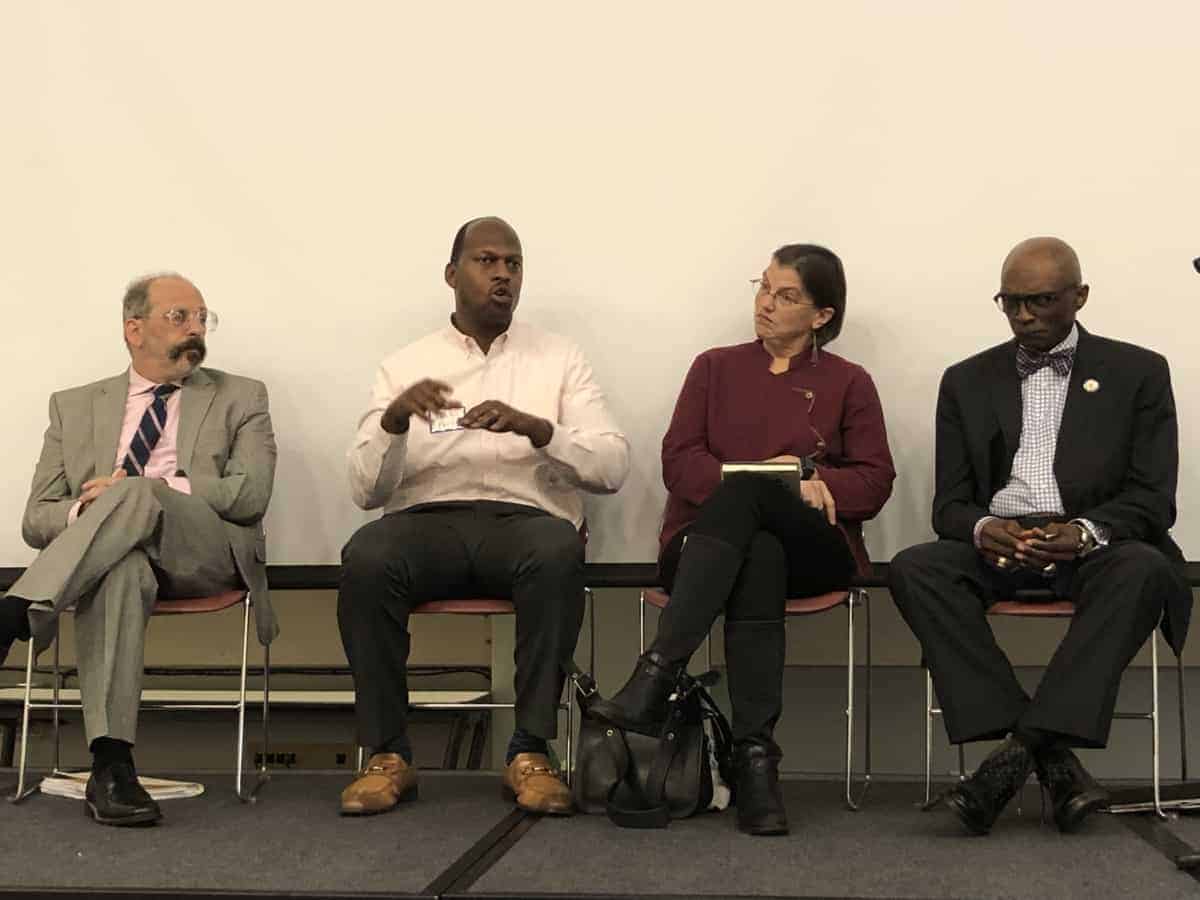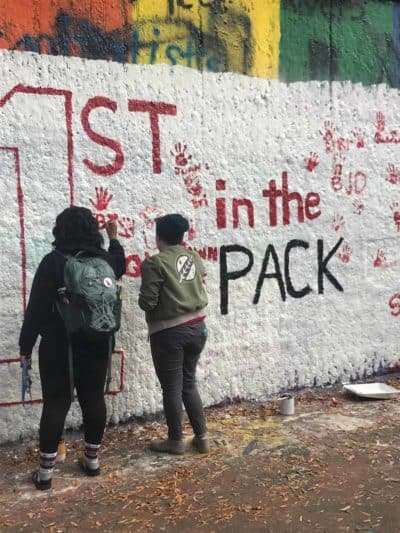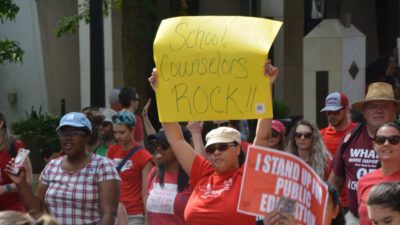
The past, present, and future of racial and economic segregation in North Carolina public schools was the topic of a Wednesday morning panel in Charlotte. “The Future of School Integration in North Carolina,” hosted by NC Policy Watch, brought together subject experts to discuss resegregation, largely in the context of Charlotte-Mecklenburg Schools (CMS). Panelists were:
- Dr. T. Anthony Spearman, president of the North Carolina NAACP
- Justin Perry, chair of OneMeck
- Pam Grundy, author of “Color and Character: West Charlotte High and the American Struggle Over Educational Equality”
- Mark Dorosin, co-director of the North Carolina regional office of the Lawyers’ Committee for Civil Rights Under Law
Rev. William Barber II, originally slated to speak at the event, gave introductory remarks via web chat:
“What do you have now in Charlotte?” he questioned. “Beneath the beautiful buildings and bountiful banking, you have the re-entrenchment of resegregation of public schools that is unlike anything else in the state of North Carolina.”
CMS, the second largest district statewide by student enrollment, is North Carolina’s most segregated school district, according to a 2018 report from the North Carolina Justice Center.
“As we stand here today, Charlotte is the most segregated school system in North Carolina, in a badly segregated state,” event moderator Billy Ball of NC Policy Watch stated, referencing the report. “CMS would have to reassign more than half of its students in order to achieve some kind of racial parity in its school system.”
The four panel members spent the event individually addressing the audience, sharing their experiences and calls to action.
Framing the present state of resegregation in historical context, Spearman recounted decades of disenfranchisement and racist practices that suppressed educational opportunities for black students leading up to the 1954 Brown v. Board of Education ruling. According to Spearman, integration efforts, which he said were slow to take hold after that ruling, struggle today due to underlying currents of white supremacy that push for the privatization of public education.
“The politics of race and public education have always been intertwined,” Spearman said, later defining the need to have a shared interest along racial lines to combat the privatization of education. “The destruction of public education is akin to poisoning the public water supply; it will have deleterious effects throughout society.”
Grundy, whose book chronicles the integration and subsequent resegregation of CMS’s West Charlotte High School, shared a personal anecdote illustrating the impact of economic integration.
“My family saw it very clearly back in 2006 when we enrolled our kindergartner in Shamrock Gardens Elementary, a high-poverty, high-minority neighborhood school with a long history of neglect and some of the lowest achievement levels in the entire state. Once Shamrock began to educate a handful of children whose families had more political and economic clout … that changed,” she said. “We got more public resources. We got more private resources. Shamrock became a much more stable and dynamic state as a result, and student achievement improved across the board for all the students. It became a better school.”
According to Grundy, integration forces those in power to have a greater stake in the success of all students. She argued that families shouldn’t hoard resources for the sole benefit of their own children, as all citizens share responsibility in tackling the task.
Speaking largely on how charter schools can hinder integration efforts, Mark Dorosin described House Bill 514 — the 2018 bill that granted four municipalities in Mecklenburg County the legal grounds to operate their own charter schools — as a “new front in the struggle for education.”
The bill allows “publicly funded charter schools [to] exclude students who don’t live in the town,” he said. By dictating who can and cannot attend such schools in predominantly white, affluent communities, Dorosin said, the bill has threatened to exacerbate the already profound effects of segregation at schools within CMS.
“The research is uniform: when you create high-poverty, racially-isolated schools, those schools get less resources,” he said.
Such resources, Dorosin said, are not strictly financial, but include curriculum offerings and highly trained teachers.
“Education is a public good,” Dorosin said. “When we start talking about privatizing that public good … we’re not just directly impacting what happens in schools, we’re directly undermining our society’s need for a well-educated group of citizens who can meaningfully and effectively participate in our own local government.”
Closing out the panel, Perry — a graduate of an integrated West Charlotte High School — challenged the notion that “organic market forces” led to the resegregation of CMS. Referring to the state legislature, he said: “We’re dumping money toward corporate folks, toward wealthy folks. We’re starving public education, then saying [schools] are failing.”
Noting the need to have honest conversations about how history is playing out in the racial design of our schools and neighborhoods, Perry described his weariness with terminology that masks the reality of what’s occurring in Charlotte.
“There’s no such thing as a ‘neighborhood school’ — we have real estate-manufactured schools,” he said. “People who have ownership and real estate developers will go in and say, ‘We want to be assigned to these schools.’ Things will shift, and you have these gerrymandered boundaries.”
CMS Board of Education Chair Carol Sawyer, who spoke briefly before the event ended with a short question-and-answer session, highlighted an opportunity for citizens to help combat resegregation efforts in the district.
“The pressure that we get from affluent communities is real, and we need your support to help us stand up to that. The pressure comes not just from the white community; our schools are profoundly economically segregated as well, and I would implore you to interrogate school board candidates … to find out where they stand on charter schools and how they feel about creating magnet schools with a home boundary,” she said.
Thirteen candidates are running for three at-large seats for CMS Board of Education on the Nov. 5 ballot.
Recommended reading



